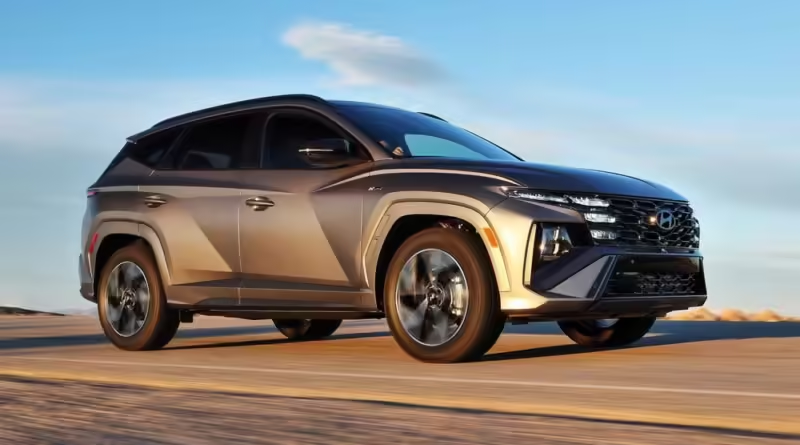2025 Hyundai Tucson: A Comprehensive Look at the Updated Compact SUV
The 2025 Hyundai Tucson has officially hit the market, showcasing a blend of refined styling, advanced technology, and a commitment to comfort. As part of the fourth generation introduced in 2022, this compact SUV has undergone a significant refresh that aims to enhance its appeal in a fiercely competitive segment. From its updated exterior to the revamped interior and improved powertrains, the Tucson is poised to attract a diverse range of buyers looking for practicality without sacrificing style.
Exterior Design: A Fresh Look
The 2025 Tucson features a more cohesive and modern exterior design, characterized by a revised front grille and bumper. The angular lines that define the Tucson’s silhouette have been retained, but the updates give it a more polished appearance. New wheel designs add a touch of sophistication, while the rear bumper and taillights have also received subtle enhancements to improve overall aesthetics.The dimensions of the Tucson have slightly changed, with a 0.4-inch increase in length, contributing to a more substantial road presence. The updated design not only enhances visual appeal but also aligns with Hyundai’s broader design language, which emphasizes boldness and innovation.

Interior Comfort and Technology
Inside, the Tucson’s cabin has been reimagined to offer a more user-friendly experience. The most notable change is the introduction of a dual-display setup, featuring a 12.3-inch touchscreen for infotainment and a digital gauge cluster, both housed within a singular rectangular design. This modern approach simplifies access to critical information while maintaining a clean aesthetic.The interior materials have been upgraded, particularly in higher trims, providing a more luxurious feel. The steering wheel and climate control panel have also been redesigned for improved ergonomics. Notably, the return of physical buttons for audio and climate controls enhances usability, addressing a common critique of previous models.
Space and Comfort
The Tucson continues to excel in terms of space, offering a roomy interior that comfortably accommodates five passengers. The front seats are particularly praised for their comfort, making the Tucson an excellent choice for long drives or daily commutes. Cargo capacity remains competitive, providing ample room for luggage or groceries, which is a crucial consideration for many SUV buyers.

Performance and Powertrains
Under the hood, the 2025 Tucson is powered by a standard 2.5-liter four-cylinder engine, generating 187 horsepower and 178 lb-ft of torque. This engine is paired with an eight-speed automatic transmission, available in both front-wheel and all-wheel drive configurations. While the acceleration is adequate for everyday driving, it has been noted that the Tucson may feel sluggish compared to some competitors, particularly in more demanding driving situations.For those seeking more power and efficiency, Hyundai offers hybrid and plug-in hybrid variants of the Tucson. The hybrid model combines a 1.6-liter turbocharged engine with an electric motor, producing a total system output of 231 horsepower. The plug-in hybrid variant boasts an even higher output of 268 horsepower, making it a compelling option for eco-conscious buyers looking for performance without sacrificing fuel economy.
Driving Experience
The Tucson’s driving dynamics are characterized by a smooth and comfortable ride, making it well-suited for urban commuting and long-distance travel. While it may not deliver the sporty handling of rivals like the Mazda CX-50 or Honda CR-V, the Tucson offers a confident and refined driving experience. The steering is responsive, and the cabin remains quiet, contributing to a sense of luxury that is often unexpected in this class.
Technology and Safety Features
Hyundai has equipped the 2025 Tucson with a host of advanced technology and safety features. Standard offerings include wireless Apple CarPlay and Android Auto, ensuring seamless connectivity for drivers. Higher trims come with additional tech enhancements, such as a head-up display and a premium sound system.In terms of safety, the Tucson is equipped with a comprehensive suite of driver-assist features, including forward collision warning, lane departure warning, and adaptive cruise control. These features not only enhance driving confidence but also contribute to the overall appeal of the Tucson as a family-friendly vehicle.

Pricing and Value Proposition
The 2025 Hyundai Tucson is competitively priced, starting at $29,750 for the base SE trim. The price range extends to approximately $40,945 for fully loaded models, making it accessible to a wide range of buyers. The mid-level SEL trim is particularly recommended, as it offers a robust set of features, including a power liftgate, heated front seats, and dual-zone climate control, all at a reasonable price point.Hyundai’s reputation for reliability and its generous warranty—5 years/60,000 miles bumper-to-bumper and 10 years/100,000 miles on the powertrain—further enhance the Tucson’s value proposition. Buyers can feel confident in their investment, knowing that they are backed by one of the industry’s leading warranties.
Conclusion: A Strong Contender
The 2025 Hyundai Tucson stands out in the crowded compact SUV market with its stylish design, spacious interior, and a strong emphasis on technology and safety. While it may not be the most powerful option in its class, its smooth ride, comfortable seating, and extensive feature set make it a compelling choice for families and individuals alike.As Hyundai continues to refine the Tucson, it remains a strong contender in the compact SUV segment, appealing to those who prioritize comfort, practicality, and modern amenities. Whether navigating city streets or embarking on a weekend getaway, the Tucson is well-equipped to meet the demands of today’s drivers, making it a noteworthy option for anyone in the market for a new SUV.
